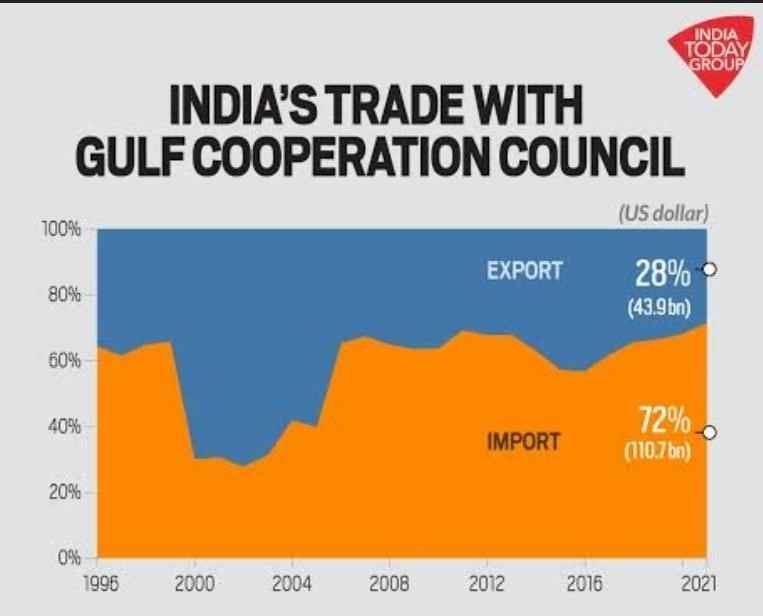Strengthening Ties in a Transforming Middle East
Syllabus:
GS 2:
- India and neighbourhood relations
- Effect of policies and politics of regional countries.
Why in the News?
Prime Minister Narendra Modi’s historic visit to Kuwait marks the first by an Indian Prime Minister in over four decades, reflecting India’s intention to strengthen its ties with the Gulf region, a critical area for its security and economic interests.
India’s Evolving Engagement with the Gulf
- Historic negligence: For decades, India’s diplomatic focus in the Middle East centered around radical nationalist republics like Iraq and Syria, often neglecting the Gulf monarchies despite their growing economic importance.
- Shift in priorities: Under Prime Minister Modi, the Gulf has emerged as a strategic priority, with India cultivating robust ties with countries like the UAE, Saudi Arabia, and now Kuwait.
- Economic interdependence: The Gulf is a major energy supplier for India, and the region’s economic modernization efforts present mutual opportunities for investment, trade, and connectivity projects.
- Security partnerships: The Arab Gulf states are key partners in India’s efforts to combat terrorism and ensure maritime security, strengthening defense and intelligence cooperation.
- Diaspora ties: The Gulf hosts a large Indian expatriate workforce, making the relationship crucial for remittances and protecting the welfare of Indian nationals.
Significance of Modi’s Kuwait Visit
- Closing the diplomatic circle: The visit completes India’s comprehensive outreach to Gulf nations under Modi, signaling an intent to deepen bilateral and multilateral cooperation.
- Reviving relations: Modi’s engagement with Kuwait addresses historical neglect, paving the way for stronger political and economic ties.
- Timing and context: Occurring amid the fall of the Assad regime, the visit underscores India’s readiness to recalibrate its policy amidst changing regional dynamics.
- Kuwait as a key partner: The shared history, coupled with Kuwait’s strategic location and energy reserves, makes it an essential ally in India’s Gulf strategy.
- Setting the stage: The visit prepares the ground for enhanced cooperation in trade, defense, and counter-terrorism, while addressing the welfare of Indian expatriates in Kuwait.
Regional Geopolitical Shifts and Their Impact on India
- Post-Assad regional order: The collapse of the Assad regime in Syria marks a shift in the Middle East, requiring India to reassess its role in a region where new alliances and rivalries are emerging.
- Reduced Pakistan influence: The growing disconnect between Pakistan and Gulf monarchies has opened avenues for India to strengthen its ties without historical constraints.
- Rising non-Arab powers: Countries like Iran, Israel, and Turkey play influential roles in the region, requiring India to carefully balance its diplomatic and economic relations to avoid alienating key partners.
- Energy transition: The Gulf’s focus on economic diversification and reducing dependence on oil revenues offers India an opportunity to collaborate on renewable energy and technology projects.
India’s Strategic Objectives in the Gulf
- Securing energy supplies: With the Gulf supplying a major share of India’s oil and gas needs, ensuring uninterrupted energy flows remains a top priority.
- Enhancing trade and investment: The Gulf’s ambitious Vision 2030 plans in countries like Saudi Arabia and UAE provide avenues for Indian businesses to expand their presence.
- Strengthening security cooperation: India seeks to deepen defense and intelligence-sharing agreements to counter terrorism and ensure stability in the region.
- Protecting diaspora interests: Safeguarding the welfare of over 8 million Indians working in the Gulf, who contribute significantly through remittances, is critical for India’s socio-economic stability.
- Building a geopolitical bridge: India aims to position itself as a mediator to foster cooperation between moderate Arab states, Israel, and Iran, contributing to regional peace and stability.
Challenges in Strengthening Relations
- Historical baggage: India’s earlier closeness with Ba’athist regimes like Saddam Hussein’s Iraq strained ties with Gulf monarchies, including Kuwait, particularly during the 1990–91 Gulf War.
- Complex regional dynamics: India must navigate tensions between moderate Arab states and regional powers like Iran, Israel, and Turkey, each with competing agendas and historical rivalries.
- Palestinian issue: Moderate Arab states remain critical of Israel’s policies towards Palestine, and India’s balancing act between Israel and the Arab world requires delicate diplomacy.
- Pakistan factor: Historically, Pakistan’s religious and strategic ties with the Gulf nations complicated India’s engagement, although this is now diminishing due to India’s stronger economic clout.
- Changing alliances: The region’s transition towards economic diversification and social reform demands India to adapt to the modern aspirations of the Gulf monarchies.
Way Forward
- Building on goodwill: India must capitalize on the personal rapport between its leadership and Gulf rulers to foster deeper economic, security, and cultural ties.
- Leveraging the Abraham Accords: India can act as a bridge to enhance cooperation between Israel and moderate Arab states, encouraging reconciliation on contentious issues like Palestine.
- Strategic alignment: Delhi must clearly define its position on regional contradictions, supporting stability in the Middle East without compromising its neutral stance.
- Economic partnerships: Engage proactively in the Gulf’s diversification efforts, particularly in areas like technology, infrastructure, and renewable energy, to bolster bilateral trade.
- Policy recalibration: Shed outdated assumptions about the Gulf region and prioritize mutual interests, ensuring India becomes an indispensable partner in the Middle East’s evolving order.
Conclusion
Modi’s visit to Kuwait is a pivotal moment in India’s Gulf diplomacy, reflecting a departure from past neglect towards a more proactive engagement. With the Gulf poised for structural transformation, India’s partnerships with moderate Arab states offer significant potential for economic growth, regional stability, and stronger geopolitical ties.
Source: Indian Express
Mains Practice Question
Examine the evolving nature of India’s engagement with the Gulf monarchies. Highlight the challenges and opportunities in light of recent geopolitical shifts in the Middle East. Suggest measures to enhance India’s strategic ties with the region.




